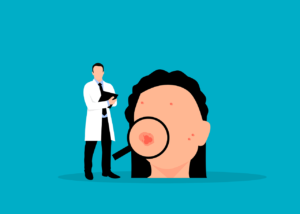Dealing with acne can be frustrating, but a targeted skincare routine can help manage breakouts and improve the overall health of your skin. By incorporating the right products and techniques, you can create an effective acne-fighting regimen that promotes clearer, healthier skin. Follow these steps to build your personalized acne-fighting skincare routine.
- Cleanse Twice Daily
Cleansing is the foundation of any skincare routine, especially for acne-prone skin. Use a gentle cleanser formulated specifically for acne to remove dirt, oil, and impurities without stripping the skin’s natural moisture barrier. Wash your face twice daily—morning and night—to keep pores clear and prevent breakouts.
- Use Salicylic Acid or Benzoyl Peroxide
Incorporate active ingredients like salicylic acid or benzoyl peroxide into your skincare routine to target acne-causing bacteria and exfoliate dead skin cells. Salicylic acid helps unclog pores and reduce inflammation, while benzoyl peroxide kills acne-causing bacteria and reduces excess oil production. Start with a lower concentration and gradually increase as tolerated to minimize irritation.
- Apply Treatment Products
After cleansing, apply acne treatment products directly to affected areas or as directed by your dermatologist. These may include spot treatments, serums, or prescription medications containing ingredients like retinoids, sulfur, or tea tree oil. Be consistent with application and allow time for the products to penetrate the skin and work their magic.
- Hydrate with Oil-Free Moisturizer
Contrary to popular belief, even acne-prone skin requires hydration to maintain a healthy moisture balance. Choose an oil-free moisturizer that won’t clog pores or exacerbate breakouts. Look for lightweight, non-comedogenic formulas that contain ingredients like hyaluronic acid or glycerin to hydrate and soothe the skin without adding excess oil.
- Protect with Sunscreen
Daily sun protection is essential for acne-prone skin, especially if you’re using acne treatment products that can increase sensitivity to sunlight. Choose a broad-spectrum sunscreen with SPF 30 or higher and apply it every morning, even on cloudy days or when indoors. Opt for oil-free or non-comedogenic formulas to avoid pore congestion.

- Avoid Harsh Scrubs and Over-Exfoliation
While exfoliation is important for removing dead skin cells and preventing clogged pores, avoid harsh scrubs and over-exfoliation, which can irritate the skin and worsen acne. Opt for gentle exfoliants like chemical exfoliants (e.g., AHAs or BHAs) or enzymatic exfoliants that dissolve dead skin cells without abrasive scrubbing.
- Be Patient and Consistent
Consistency is key when it comes to managing acne. Stick to your skincare routine consistently and be patient with the results. It may take several weeks or even months to see significant improvement, so don’t get discouraged if you don’t see immediate results. Trust the process and give your skin time to adjust and heal.
- Maintain a Healthy Lifestyle
In addition to a targeted skincare routine, maintaining a healthy lifestyle can also help manage acne. Eat a balanced diet rich in fruits, vegetables, and whole grains, and limit processed foods and sugars, which can exacerbate inflammation and acne. Stay hydrated by drinking plenty of water, get regular exercise to promote circulation and detoxification, and manage stress through relaxation techniques like meditation or yoga.
- Avoid Touching Your Face
Avoid touching your face with your hands throughout the day, as this can transfer bacteria and oils onto the skin, leading to breakouts. Resist the urge to pick, squeeze, or pop pimples, as this can cause further inflammation, scarring, and spread of bacteria. Instead, practice good hygiene by washing your hands regularly and using clean towels and pillowcases to minimize the risk of bacterial transfer.
- Seek Professional Help if Needed
If your acne persists despite diligent skincare efforts, don’t hesitate to seek professional help from a dermatologist. They can assess your skin condition, identify underlying causes of acne, and recommend personalized treatment options tailored to your needs. This may include prescription medications, in-office procedures like chemical peels or laser therapy, or lifestyle modifications to address contributing factors.
- Adjust Your Routine as Needed
As your skin changes over time, it’s important to adjust your skincare routine accordingly. Pay attention to how your skin responds to different products and environmental factors, and make changes as needed to address new concerns or fluctuations in your skin condition. Regularly reassessing your routine ensures that you’re providing your skin with the best possible care and optimizing your chances of achieving clear, healthy skin.
- Embrace a Holistic Approach
In addition to focusing on skincare, consider adopting a holistic approach to managing acne by addressing factors that can contribute to skin health. This includes paying attention to your diet, managing stress levels, getting enough sleep, and avoiding habits that can worsen acne, such as smoking or excessive alcohol consumption. By taking care of your overall well-being, you can support your skin’s natural healing processes and improve its resilience against breakouts.
- Practice Gentle Makeup Removal
If you wear makeup, it’s important to remove it gently at the end of the day to prevent clogged pores and breakouts. Use a gentle makeup remover or micellar water to dissolve makeup, followed by a thorough cleansing with your regular cleanser. Avoid harsh scrubbing or rubbing, as this can irritate the skin and exacerbate acne. Opt for non-comedogenic and oil-free makeup products to minimize the risk of pore congestion.
- Monitor Hormonal Changes
Hormonal fluctuations can play a significant role in acne development, particularly in women. Keep track of your menstrual cycle and any hormonal changes that may coincide with breakouts. Consider speaking with your healthcare provider about hormonal contraceptives or other hormonal treatments that can help regulate hormone levels and reduce acne symptoms. Additionally, certain lifestyle changes, such as managing stress and getting regular exercise, can also help balance hormones and improve skin health.
- Be Kind to Yourself
Dealing with acne can take a toll on your self-esteem and confidence, but it’s important to be kind to yourself throughout the process. Remember that acne is a common skin condition that many people experience, and it doesn’t define your worth or beauty. Focus on nurturing your skin with a gentle and consistent skincare routine, practice self-compassion, and surround yourself with supportive friends and loved ones who uplift and encourage you.

- Keep a Skincare Journal
Consider keeping a skincare journal to track your progress and identify patterns in your skin’s behavior. Note down the products you use, any changes you observe in your skin, and factors that may affect your skin health, such as diet, lifestyle, and hormonal fluctuations. This can help you pinpoint triggers for breakouts and fine-tune your skincare routine for optimal results.
- Practice Patience and Persistence
Achieving clear, healthy skin takes time and consistency, so it’s important to practice patience and persistence throughout your skincare journey. Don’t get discouraged by setbacks or slow progress—focus on the positive changes you see in your skin over time and celebrate small victories along the way. With dedication and perseverance, you can achieve the clear, glowing complexion you desire.
- Share Your Experience and Learn from Others
Don’t hesitate to share your skincare journey with others and learn from their experiences. Join online communities, forums, or social media groups dedicated to skincare, where you can connect with others who are dealing with similar skin concerns and exchange tips, product recommendations, and support. Learning from others’ experiences can provide valuable insights and inspiration for refining your own skincare routine.
- Consult with a Dermatologist
If you’re struggling to manage your acne or if your skin condition worsens despite your best efforts, consult with a dermatologist for professional guidance and treatment options. Dermatologists are trained experts in skin health and can assess your skin condition, provide personalized recommendations, and prescribe medications or procedures to help address your acne effectively. Don’t hesitate to seek professional help if needed—it’s the first step towards achieving clearer, healthier skin.
Conclusion
Creating an acne-fighting skincare routine is a journey that requires patience, perseverance, and a willingness to adapt and learn along the way. By following these steps and incorporating healthy habits into your daily routine, you can effectively manage acne, improve the health and appearance of your skin, and boost your confidence in your complexion. Remember to be patient with yourself, stay consistent with your skincare routine, and prioritize self-care as you work towards achieving clearer, healthier skin.
